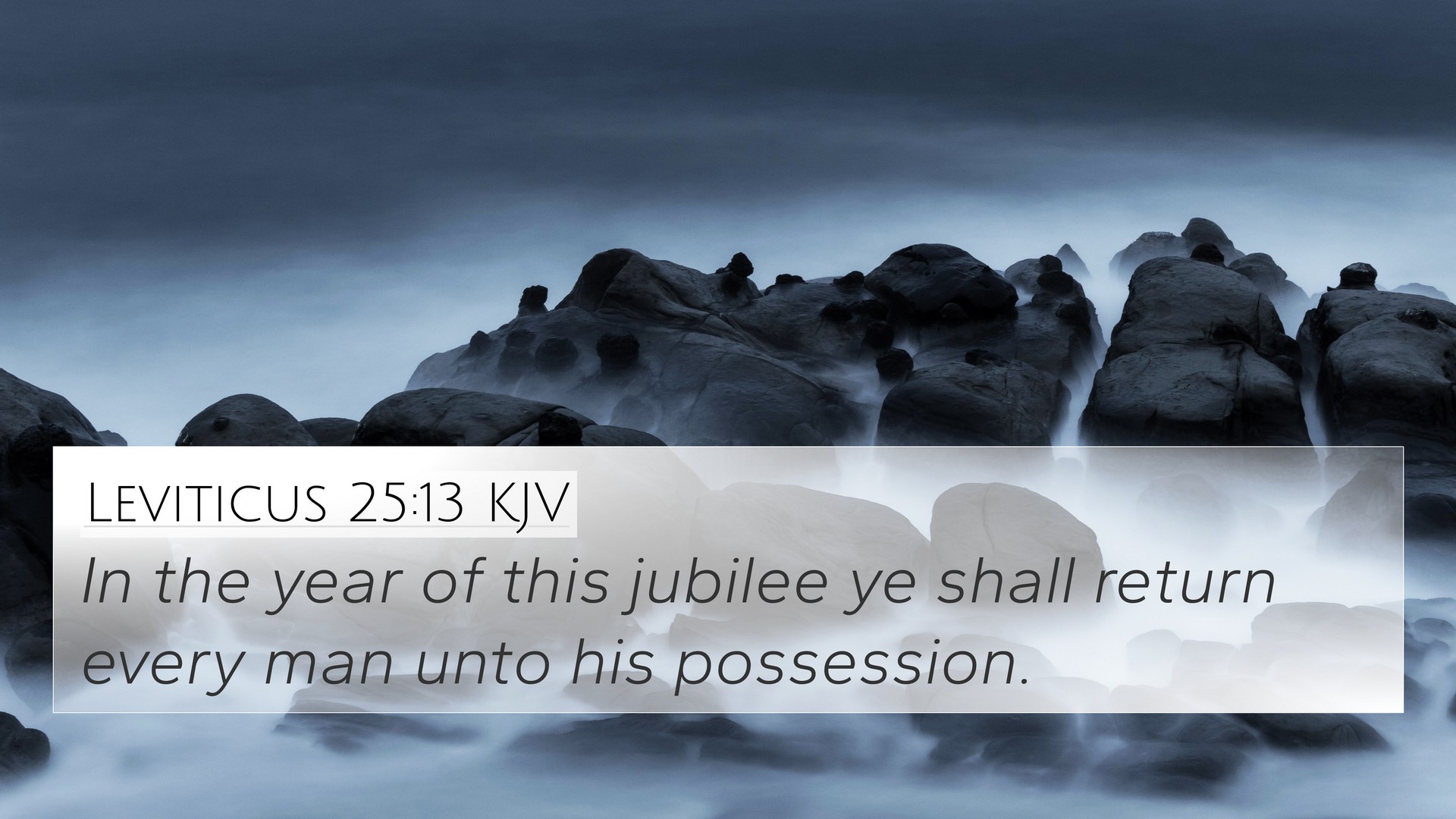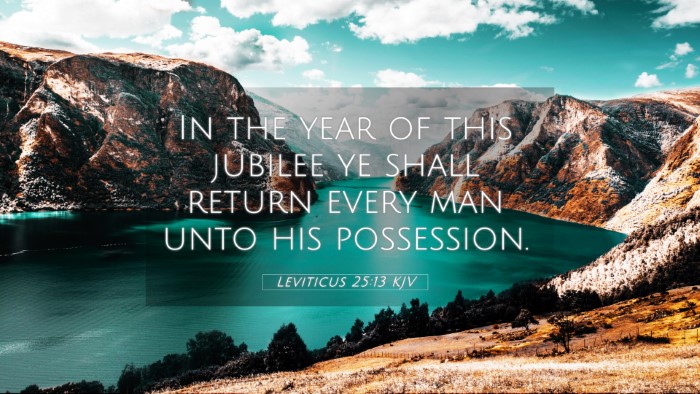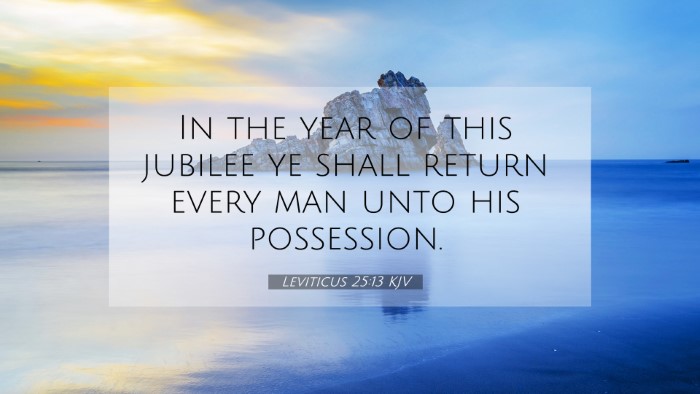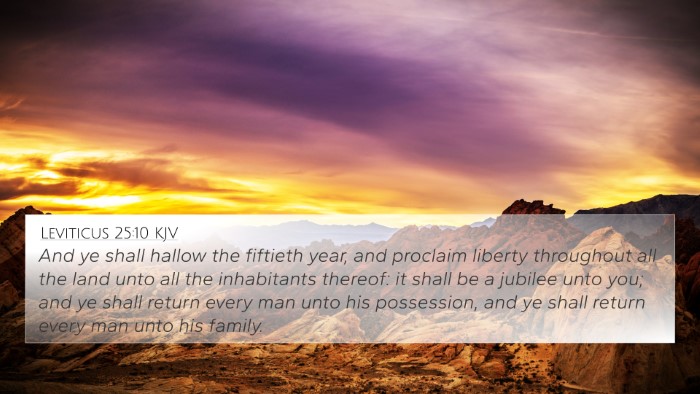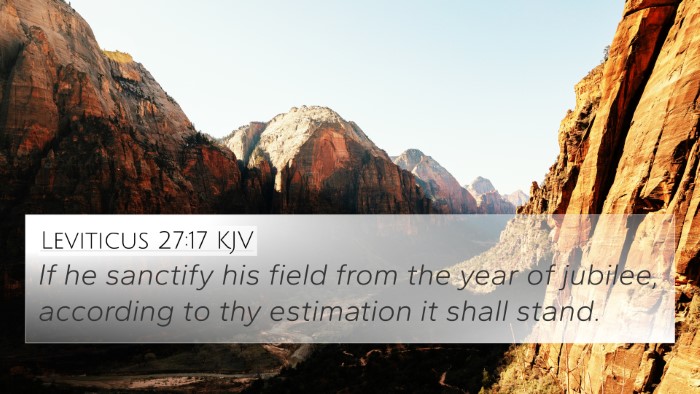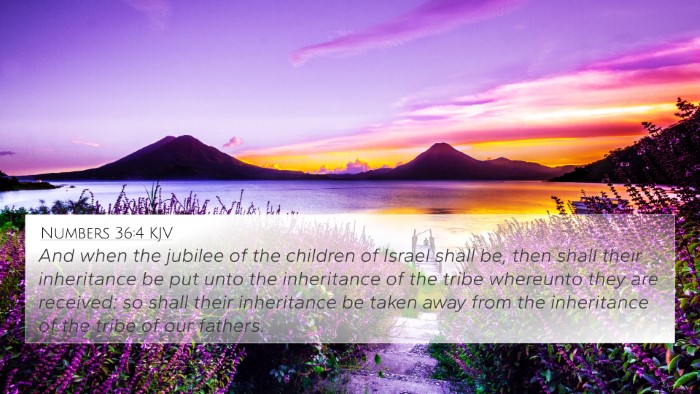Meaning and Interpretation of Leviticus 25:13
Leviticus 25:13 states, "In this year of jubilee you shall return, every man to his possession, and you shall return every man to his family." This verse plays a critical role in the context of the Jubilee Year, a profound time of restoration and freedom in the Israelite society. This summary draws upon insights from notable public domain commentaries, providing a comprehensive understanding of the verse.
Contextual Significance
The verse occurs within the larger framework of laws regarding the Jubilee, established in Leviticus 25. Each fiftieth year, all debts were forgiven, and lands that had been sold due to financial distress were returned to their original owners. In this way, God provided a continual opportunity for restoration and equality among His people.
Insights from Matthew Henry's Commentary
Matthew Henry emphasizes the themes of liberty and equity present in this verse. He notes that the Jubilee represents a divine reset for the Israelites, reflecting God's desire for His people to live in freedom and harmony. He underscores that the return of possessions and families served to restore dignity and heritage among the Israelites, ensuring that no tribe would lose their inheritance permanently.
Insights from Albert Barnes' Commentary
Albert Barnes further elaborates on the implications of this command. He points out that the Jubilee not only restored property ownership but also fostered community solidarity. Each individual had the opportunity to regain their place in society, eradicating the debts that might have led to their loss of land. This cyclical renewal reflects God’s love and justice, ensuring that the margins of society were cared for annually.
Insights from Adam Clarke's Commentary
Adam Clarke provides a deeper theological insight, explaining that the year of Jubilee also signifies the ultimate salvation and restoration found in Christ. He draws a parallel between the physical restoration represented in this verse and the spiritual restoration offered through the New Testament. Clarke argues that Christ is our ultimate Jubilee—bringing redemption and restoration to all believers.
Thematic Connections and Cross-References
Leviticus 25:13 has various cross-references throughout the Bible that enrich its understanding. Here are some of the key connections:
- Isaiah 61:1-3 - Proclaims the year of the Lord’s favor, mirroring the themes of restoration found in Leviticus.
- Luke 4:18-19 - Jesus references Isaiah, aligning Himself with the jubilee message of freedom and restoration.
- Deuteronomy 15:1-2 - Discusses the forgiving of debts every seven years, highlighting the principle of financial mercy.
- Ezekiel 46:17 - Mentions the return of property to its original owners as part of the Jubilee observance.
- Numbers 36:4 - Addresses inheritance issues and preservation of family lines, emphasizing the importance of land restoration.
- Matthew 5:5 - “Blessed are the meek, for they shall inherit the earth.” This beatitude echoes the values of humility and restoration present in Jubilee.
- Romans 8:21 - Indicates the creation’s yearning for freedom, akin to the themes of liberation in Jubilee.
Understanding Through Cross-Referencing Biblical Texts
Cross-referencing biblical texts is essential for deepening biblical understanding. Tools like a Bible concordance and Bible reference resources can help individuals identify connections between Old and New Testament themes effectively. Such resources allow for thorough comparative Bible verse analysis, facilitating an enriched study experience.
Exploring Related Themes
The themes of restoration, equity, and freedom in Leviticus 25:13 can be observed throughout scripture, drawing connections between various passages. These themes are essential for interpreting both Old Testament laws and New Testament teachings about redemption.
Conclusions on Leviticus 25:13
In conclusion, Leviticus 25:13 encapsulates God's profound care for justice and restoration among His people. By understanding this verse through public domain commentaries, we recognize its contemporary relevance, echoing through Christ's message of salvation. Cross-referencing Biblical texts enhances our interpretation by revealing the rich tapestry of divine principles woven throughout scripture.
How to Find Cross-References
For those looking to engage with Bible cross-reference guides, consider these practical steps:
- Utilize a Bible cross-reference system available in many Bible editions, which includes marginal notes linking relevant verses.
- Consult online Bible tools that feature a cross-reference Bible study section.
- Keep a personal Bible cross-reference notebook for jotting down connections as you study.
Recommended Study Methods
Engaging in cross-referencing Bible study methods can involve comparing thematic or textual links. For instance, when analyzing scripture on freedom, incorporate cross-references to verses like Galatians 5:1, which speaks to freedom in Christ. This method not only broadens understanding but also reveals God’s overarching narrative of redemption throughout the Bible.
